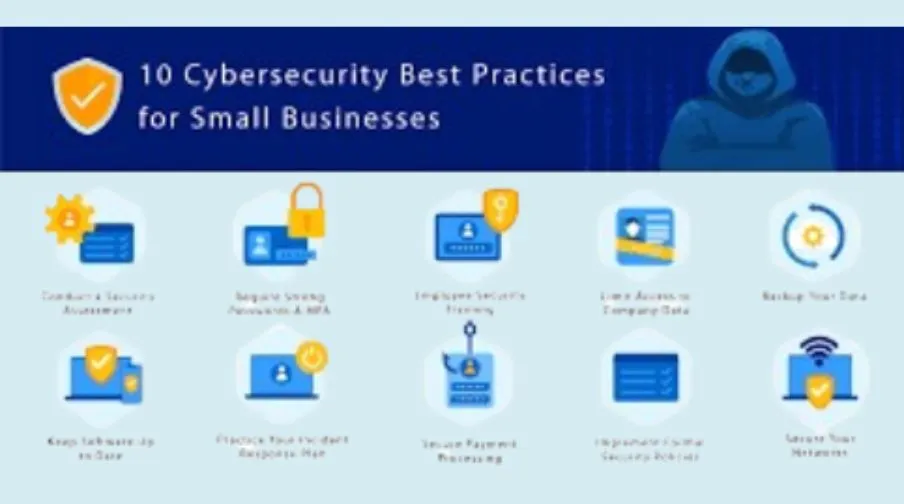Cybersecurity is the best practice of protecting systems, networks, and programs from digital attacks. These attacks aim to access, change, or destroy sensitive information, extort money, or interrupt normal business processes. However, it is good to implement robust cybersecurity measures, which are essential for safeguarding data and maintaining trust.
In this world of technology, new ways exist to impose cyber attacks. For more information, check out this complete guide and cybersecurity best practices. Suppose you have an additional business system and want to secure it from cyberattacks. In that case, you can follow the cybersecurity best practices, manage your online presence, and make a secure business.
Regular software updates, strong passwords, and caution with email attachments are basic yet effective strategies. Thus, these practices help prevent unauthorized access and reduce the risk of cyber threats.
Cybersecurity Best Practices And Tips For Your Business Security
Cybersecurity is essential for your business and is linked to your online websites. So, it is good to implement cybersecurity best practices to protect your business and your accounts from cyber-attacks.
Implement Strong Password Policies
Passwords are one of the cybersecurity best practices, and they are simple to add. Therefore, ensure all employees use strong, unique passwords that combine letters, numbers, and special characters. Encourage regular password updates and the use of password managers. Moreover, add all your passwords with all digits and signs to secure them from any cyber attack. Overall, it is good to use strong passwords.
Utilize Multifactor Authentication (MFA)
Multifactor authentication for all your social and other accounts requires it. Therefore, MFA is used to access sensitive systems. So, this gives an extra layer of security to combine something the user knows (password) with something the user has (mobile device) or something the user is (biometric data). Moreover, add the device to use the MFA or backup codes to access login access. Overall, this is a security and cybersecurity best practice.
Educate Employees on Cyber Threats
Therefore, always train your business employees properly and add strong security. However, it is good to regularly train employees to recognize phishing emails, suspicious links, and other common cyber threats. Awareness and vigilance are vital to preventing breaches. Hence, it is also good to Hire employees with good knowledge to save your accounts and business.
Keep Software And Systems Updated
As we know, all online and technology businesses are to need software. So, it is also a cybersecurity best practice to try and update software. Regularly update all software, operating systems, and applications to the latest versions. Patching vulnerabilities promptly helps protect against known exploits. Moreover, add secure and reliable software to your business and make it safe from cyber-attacks.
Use Firewalls And Antivirus Software
Bugs and virus attacks are significant cybersecurity issues. Therefore, it is suitable for an online business to add software against virus attacks. Thus, firewalls should be added to monitor and control incoming and outgoing network traffic. Install and maintain reliable antivirus software to detect and remove malware.
Backup Data Regularly
Data is essential for any business. Therefore, add up your data backup to make your business secure for business privacy. Moreover, it is good to perform regular backups of critical data and store them securely. It is also good to ensure that backups can be quickly restored in case of data loss or ransomware attacks.

Encrypt Sensitive Information
End-to-end encryption is the most essential part of business and account security. Therefore, encryption should be used to protect sensitive data both in transit and at rest. Encryption ensures that even if data is intercepted, it remains unreadable without the proper decryption key. Overall, it is the cybersecurity best practice to make your account safe.
Limit Access To Sensitive Data
As you know, most systems grant access with some limits. So, this is an additional way to provide limited access to users and employees. So, add the principle of least privilege access to employees’ access only to the data and systems necessary for their job functions. Regularly review and adjust access permissions.
Develop And Enforce Security Policies
A proper policy and plan for a business promotion is good. Therefore, comprehensive cybersecurity policies that outline acceptable use, data protection, and incident response procedures should be created. Ensuring all employees know and adhere to these policies is also good. Hence, this is a perfect security system to save your accounts from cyber-attacks.
Monitor Network Activity
Continuously monitor network activity for unusual behavior or potential threats. Use intrusion detection and prevention systems (IDPS) to add and respond to suspicious activities promptly. It is also good to check activity and working systems. Adding proper software to your accounts can help ensure your business’s safety.
Use A VPN for Security
You use a virtual private network (VPN) for enhanced security and privacy. A VPN encrypts your internet connection, safeguarding your private information from even your internet service provider. It is also good to try the best VPN and pay for your secure VPN. Moreover, VPNs with additional benefits and proxies provide complete security from cyber-attacks.
Verify Links Before Clicking
Therefore, links can be deceptive and lead to malicious sites. Always hover over a hyperlink to preview the URL before clicking, ensuring it directs you to a legitimate destination. Overall, make your complete security to give limited access to URLs and links.
Disable Bluetooth When Not In Use
Disabling Bluetooth when it’s not in use is a simple yet effective cybersecurity measure. Bluetooth can be a point of entry to access your device and steal personal information. But, you need to minimize the risk of unauthorized access and potential data breaches by keeping it off when unnecessary.
This practice is critical in public spaces where cybercriminals are more likely to exploit Bluetooth vulnerabilities. Ensuring your Bluetooth is disabled enhances security posture and protects sensitive information from potential threats.
Conclusion
Adopting cybersecurity best practices is essential for protecting your business from digital threats. By implementing strong password policies, utilizing multifactor authentication, educating employees, regularly updating software, using firewalls and antivirus software, backing up data, encrypting sensitive information, limiting access, developing security policies, monitoring network activity, and using a VPN, you can significantly enhance your security posture.
These proactive measures help safeguard your business’s data, maintain customer trust, and ensure a resilient defense against evolving cyber threats.
Frequently Asked Question
What Is The Most Important Cybersecurity Practice For Businesses?
The most crucial cybersecurity practice is implementing strong password policies. Ensure all employees use complex, unique passwords and change them regularly to prevent unauthorized access.
How Often Should We Update Our Software And Systems?
Regular updates are essential for security. To protect against known vulnerabilities and exploits, aim to update software and systems as soon as patches are released.
What Is Multifactor Authentication (MFA), And Why Is It Important?
MFA requires users to provide two or more verification factors to gain access. It’s important because it adds an extra layer of safety, making it harder for attackers to breach accounts.
Why Should We Train Employees on Cybersecurity?
Employee training is vital because human error is a common cause of security breaches. Regular exercise helps employees recognize and respond to cyber threats like phishing, reducing the risk of successful attacks.
How Does Using A VPN Enhance Security?
A VPN (Virtual Private Network) encrypts your internet connection, protecting your data from being intercepted by cybercriminals. It also masks your IP address, providing additional privacy and security online.
What Are The Best practices For Internet security?
Best internet security practices include using strong, unique passwords, enabling multifactor authentication, and regularly updating software. Additionally, educating employees on recognizing cyber threats and using a VPN for secure connections is essential. Implementing these measures helps protect against unauthorized access and data breaches.
What Are The 5 Areas Of Cybersecurity?
The five areas of cybersecurity are:
Network Security: Protecting the infrastructure from unauthorized access and attacks.
Information Security: Safeguarding data integrity and privacy.
Endpoint Security: Securing devices like computers and mobile phones.
Application Security: Ensuring software is free from vulnerabilities.
Operational Security: Managing and protecting data handling processes.






